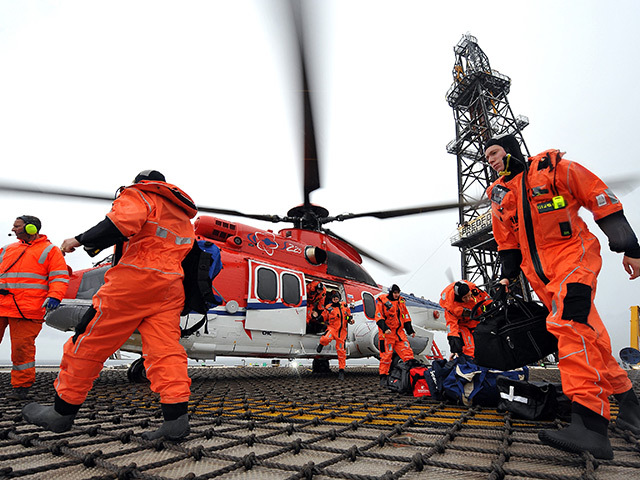
Offshore workers are being asked if they would be “comfortable” flying in the same type of North Sea helicopter that crashed off Norway killing 13 people last year.
Airbus chief executive Tom Enders said he is “hopeful” that Norway and the UK’s ban on Super Pumas, imposed in the aftermath of the tragedy, would be lifted soon.
And now the French firm is looking to gauge public opinion following a safety overhaul.
Last night safety watchdogs said there was “no question” that the survey was part of an attempt to bring the Super Puma aircraft back to the UK oil and gas industry.
And they claim the workforce has already made it clear that they have lost faith in the safety of the aircraft.
Different variants of the Super Puma have been involved in a number of ditchings in recent years, including two fatal North Sea accidents which claimed a total of 20 lives.
The three main UK helicopter operators, Bristow, CHC and Babcock, have now mothballed or disposed of their affected fleets and switched to alternatives, such as the Sikorsky S92 which can only hold 19 passengers compared to the 24 seats in the Super Pumas.
But last night one Aberdeen-based operator did not rule out returning the 225s to service.
They said it would only be considered if the flight ban was lifted and their clients approved.
Another operator confirmed it had no Super Pumas in its fleet and said it had no intention of reintroducing them.
The UK’s Civil Aviation Authority has confirmed that the ban remains in place.
And Norway’s flight safety watchdog said it would remain in effect until the authorities are “absolutely” sure the aircraft are safe to fly.
Les Linklater, executive director of Step Change in Safety, said a “phenomenal” amount of work would need to be done to restore workforce confidence.
He said that even if the CAA lifted the ban, there would likely be a long period of readjustment before the Super Pumas started flying again over the North Sea. He said: “The workforce, from way back to the fatal accident in 2009, have really clearly expressed their opinions about this aircraft and the family of Super Pumas.
“There is no member of the workforce who is overly keen to see this aircraft being reintroduced.
“We’ve had a series of recurring events, be it the fatal crashes here or in Norway. We’ve seen gearbox and technical issues that have led to the aircraft going into the water, and sadly the loss of life.
“And the workforce continue to express concerns about the internal cabin space as it’s perceived to be more cramped than other aircraft types.”
He added: “The survey itself is fairly innocuous but you’ve got to be willing to do something with the feedback.
“You have to believe, at some point in the future of this aircraft, sufficient evidence and research will be done to demonstrate to the regulators that it is safe to fly.
“That doesn’t mean it will return but it does mean the CAA’s position may change. It’s then up to the workforce and industry if they have the appetite to fly this aircraft – and do we have the confidence to ask people to get into the back?”
Norwegian operator Statoil said previously it will not use Super Puma helicopters even if the flight ban is lifted. The operator stood by the statement last night.
Airbus has lost its market share of offshore helicopter transfers in the UK and Norway since a flight ban was imposed last year on the back of the Norway crash. The aircraft, and its sister AS332L2 model, have been banned from flying in the UK and Norway since October.
This is despite European air safety watchdog EASA lifting restrictions on commercial flights that were imposed in the aftermath of the Norway crash.
French firm Airbus, formerly known as Eurocopter, is seeking feedback over safety improvements made to the aircraft since then.
A spokesman said that any potential return to service for the Super Pumas was entirely in the hands of the CAA.
The spokesman said: “Airbus Helicopters has launched an online helicopter users’ survey.
“We are keen to hear directly from these users, mainly pilots and passengers, regarding their thoughts on helicopter features in general and the H225 in particular.
“This broad and valuable feedback is key to helping us address the concerns, priorities and requirements of those who use our helicopters on a daily basis.”
The Offshore Co-ordinating Group, which represents all manner of offshore employees, said in a statement it was “surprised” at the content of the survey and “disappointed” that it had not been consulted.
However the collective, whose members include Unite, GMB, RMT, Nautilus, and pilots union Balpa, encouraged North Sea workers to make their feelings known.
A spokesman for CHC Helicopters said that the firm did not have any Super Pumas in its UK fleet.
Babcock said: “All decisions regarding aircraft types are always taken in close consultation with our customers”.
Bristow declined to comment.
Recommended for you
